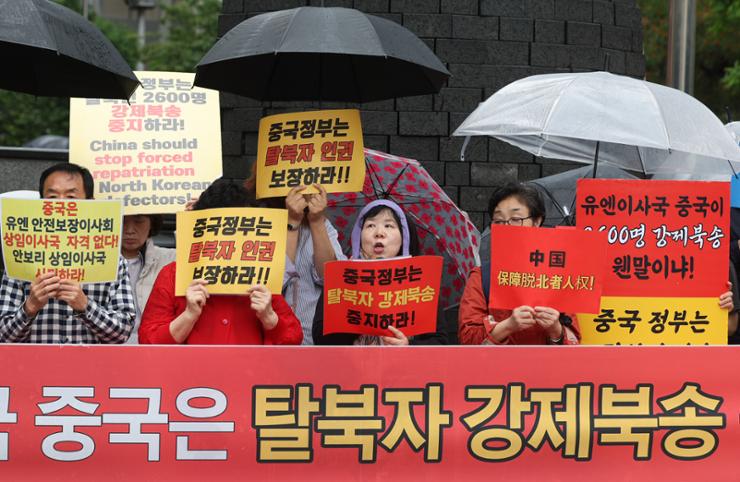The South Korean government’s response to China’s forced repatriation of North Korean escapees has seemed somewhat subdued, amid desperate efforts to maintain the cautious improvement of bilateral ties between Seoul and Beijing and eventually pave the way for a long-delayed three-way summit including Japan, anticipated later this month.
With a meeting coming up this week between the foreign ministers of the two nations, spurring ongoing discussions for the high-stakes trilateral summit, Seoul has apparently opted for a cautious approach toward the North Korean defector issue to avoid triggering further tensions.
Foreign Minister Cho Tae-yul will embark on a two-day visit to Beijing, Monday, the first visit in more than six years by a top South Korean diplomat to the Chinese capital.
The Yoon Suk Yeol government has consistently urged Beijing to refrain from repatriating North Korean escapees against their will, but this has been significantly toned down — even though China recently sent back dozens of North Korean defectors.
The Korean Unification Solidarity, an organization for North Korean refugees, claimed last week that around 200 North Korean refugees who were apprehended in northeast China’s Jilin province were forcibly sent back to their reclusive home country on April 26. According to the international organization Human Rights Watch, the Chinese government forcibly returned about 60 North Korean refugees in a similar period.
However, the South Korean government has refrained from issuing an official condemnation of China’s recent actions, a departure from its previous practices.
The Ministry of Unification reiterated its position that North Korean defectors should not be returned against their will under any circumstances, without officially confirming the speculation.
This marks a shift from the ministry’s response last October when the Chinese government repatriated at least 500 North Korean defectors following the Hangzhou Asian Games. At that time, the unification ministry officially acknowledged the repatriation just two days after human rights organizations raised the speculation, and said, “We have strongly raised this issue with the Chinese government and regret the situation.”
The Ministry of Foreign Affairs declined to confirm whether South Korea has lodged a protest to China through diplomatic channels regarding the latest repatriation that occurred in April, stating that “related discussions with China have been ongoing at various levels.”

Foreign Minister Cho Tae-yul speaks during a closing ceremony for a meeting of South Korean overseas diplomatic mission chiefs at the ministry headquarters in Seoul, April 26. Yonhap
Lee Sang-man, a Chinese affairs expert at the Kyungnam University Institute for Far Eastern Studies, suggested that it is unlikely South Korea has lodged a strong protest with China, nor will Minister Cho bring up the issue during his upcoming meeting with Wang.
Lee viewed that the seemingly restrained response is aimed at avoiding any disruption to the preparations for the upcoming trilateral summit, which is likely to be held in Seoul from May 26 to 27.
Amid enhancing trilateral cooperation between South Korea, the U.S. and Japan, China has shown reluctance to participate in the event, the rotating chair of which is currently held by Korea. The last such summit took place in 2019.
“The primary objective of Cho’s visit is to lay the groundwork for the summit. Bringing up the issue of North Korean escapees, where reaching common ground between the two sides is elusive, would not be a good idea. It’s important for Seoul to keep efforts to find common priorities with China for the summit,” Lee said.
Lee also viewed that South Korea’s repeated demands for China to halt the repatriation have not yielded desired results, as Beijing sometimes uses the North Korean refugee issue as diplomatic leverage against Seoul.
“The trilateral meeting, if held, would be meaningful in spurring the long-stalled three-way cooperation. However, consensus on security matters would be challenging to achieve. Less sensitive topics such as people-to-people exchanges, environmental issues and cyberspace could offer areas of agreement,” he noted.

